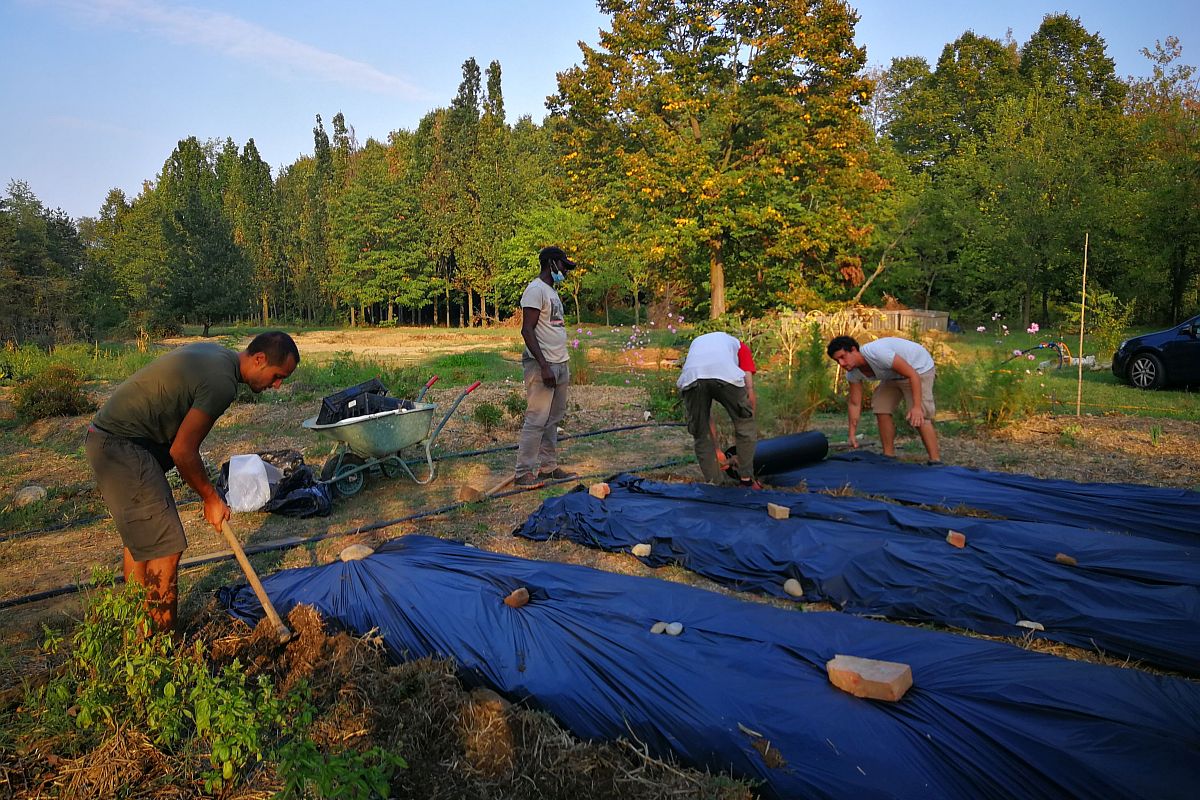Abbiamo parlato dell’arrivo a Salus Space dei due container riciclati (sono container marittimi rigenerati) per la produzione innovativa di funghi e microgreens, grazie al progetto europeo FoodE.
Come funzionano?
Ce lo spiega Francesco Lombardo di Aquaponic Design, in occasione della giornata di inaugurazione (14 gennaio 2023, chiusura del FoodEinBO festival).
Ora ci spostiamo dentro il container per la coltivazione dei funghi…
Nele, che abita a Salus, ha assistito alla giornata del 14 gennaio. Il suo racconto.
Pensa globale, mangia locale
Think global, eat local
As our demand for food increases drastically depending on the growing world population, it’s time to find new answers to the questions: How do we consume? How do we produce? And how can we do so with less energy and more sustainable resources?
FoodE (Food Systems in European Cities) is a project financed by the European program Horizon 2020 that aims to find innovative solutions to those concerns. In collaboration with the University of Bologna, 24 different organizations across Europe are participating to create sustainable food systems in urban areas.
Part of that is Salus Space as a pilot project for urban agriculture, including research in the fields of aquaponic, container farms and bio lakes.
Salus Space. 14 January 2023. It’s the last day of the FoodEinBO festival.
Starting with a few words by Inti Bertocchi, part of the municipality of Bologna, the participants are introduced into today’s program.
Furthermore, the president of the Savena district Marzia Benassi points out the importance of creating a new culture of awareness for sustainability – socially as well as politically. It needs to be implemented and grown not only in the new generation, but also in the older ones and it needs to happen in various different ways within the society.
Sonia Blasioli, from the University’s Department of Agricultural and Food Science, shows us in a concrete example how that can be realized.
“How did our eating habits changed in the past decades and centuries? And how will our food look like in the future?”, she asked to pupils of a primary school in Bologna. In order to find answers to those questions, the children collected recipes from their families, asking what their grandparents used to eat when they were young. After having shared and cooked them together at school, their results are now shown in the book “Le ricette del passato” (“recipes of the past”), codesigned by Design students of the University of Bologna.
The role of Salus Space within the FoodE projects. It’s time to take a look at the three main projects of Aquaponic Design, located in Salus Space. Today, they are introduced to us, the visitors and participants:
Recently, two container farms of 25 square meters each arrived in Salus, one for mushrooms and one for microgreens. Due to their closed, circular systems, fungi and plants can grow all year, independent from seasonal changes.
As Luca, one of the members of Aquaponic Designs, opens the door of the mushroom container, a white mist comes out of the inside. 90% air humidity, around 15-20° temperature and a higher level of CO2 than usually, everything controlled via an application. Within two weeks under those conditions, about 150kg of mushrooms can grow out of the 156 bales that are placed on the three floors inside the container at the moment. Using the full capacity, it could be around 400kg, up to 800kg after 6 weeks. Each bale is made out of straw and is around the size of a common backpack. In a controlled environment, they were inoculated with the mycelium of mushrooms before, in that case Cardoncelli, which then colonized the straw inside the bale. Having completed the incubation phase – that depending on the type of mushroom can take between two weeks or even a year – the bales are transferred to the container farms, in which they pass the second phase: fructification, where a thousand little mushroom heads grow out of the white and yellow substrate bales. Once the bales are not used for the production anymore, they will fulfill another purpose as an organic fertilizer for the garden right next to the container.
We continue our tour and gather around the bio lake in the backyard of Salus. The sun is reflecting on its surface and the flanking forest is mirrored in the water.
Not even one year ago, in April 2022, the lake was established here in order to add another alternative project of Aquaponic Designs. The goal is to create a rich biodiversity a stable system full of microorganisms, that sooner can be used as substantial organic nutrition for plants in the garden. On the edges of the bio lake, two floors of plant terrasses are surrounding the water basin, filtering the water in a natural way.
Last but not least, Luca presents to us the three tanks of hydroponics – a form of agriculture without the use of soil. Instead, plants are growing on expanded clay, a granular material above a water tank. At the moment, the tanks are filled with different kinds of nutrition substituted inside the water to find out, what methods can satisfy the needs of the plants growing above the best. As it is a closed and even self-sufficient circle, it is quite resilient against parasites or other external influences and can be installed in various different environments independent from the actual, local conditions of the soil. Also abandoned places or areas with less resources in terms of water or space can be taken into consideration.
In a long-term view, those mechanisms based on a very basic concept could be provided also for private use – creating a sustainable solution for home grown vegetables, accessible for everyone!
Lunch time. Coming together in the locanda, we conclude the festival week with Syrian dishes made out of our own garden’s vegetables. Following the idea of thinking global and eating local.
Nele Reisener
foto e video di Francesco Quero



